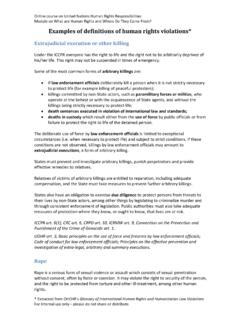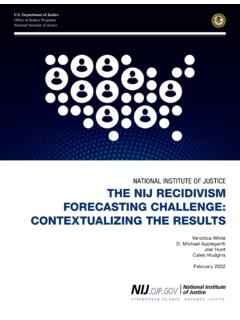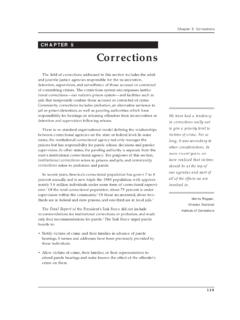Transcription of CAUSES OF CRIME - Utah Education Network
1 CAUSES OF CRIME CHAPTER 3 VERSION 2016 U TA H STAT E BOARD OF Education CAREER AND TECHNICAL E D U C AT IO N 3-1 CHAPTER THREE: EXPLANATIONS OF CRIME INTRODUCTION It is best to start this unit by emphasizing that there is no single cause of CRIME . In addition, there is no single explanation for criminal behavior that is agreed upon by even a majority of criminologists, those individuals who study the CAUSES of CRIME . However, it is still important to study this particular subject so that society can attempt to properly deal with the most important law enforcement task, that of CRIME prevention.
2 Only by learning why certain people commit certain crimes can a society or a community act to stop them. There are reasons for all crimes, though the person who commits the CRIME may not know the reason. The police and the public may not know either, but if such CAUSES can be determined through study, then prevention or rehabilitation becomes much easier to accomplish. The following material is arranged into categories, depending on where it is generally believed that criminal behavior originates. Some of these ideas are no longer widely accepted, but are interesting examples of how CRIME has been explained in the past.
3 PSYCHOLOGICAL EXPLANATIONS Psychological explanations for CRIME are based on the mind and its mental processes. Many of the explanations for criminal behavior are based on the pioneering theories of Sigmund Freud and the treatment known as psychoanalysis. Freud taught that there are three mental processes: id, ego, the super-ego. The id is the source of drives to gratify certain basic needs, such as food, sex, power, etc. The super-ego equates to a person's conscience. The ego is the integrating process that tries to find a balance between the id and the super-ego.
4 Freud believed that there are three different interactions between id, ego, and super-ego that lead an individual to commit a CRIME . First, some individuals fail to develop proper super-ego controls. In other words, an individual is not taught or does not learn what parents, teachers, religious leaders, and others offer regarding what society considers right and wrong. Second, some individuals have very strong obsessive-compulsive actions, a part of the id they are unable to control. Because the individual is unable to control his or her desire for a specific gratification, he or she commits a CRIME to satisfy the desire.
5 Third, Freud taught that people often have extreme mental conflicts that produce guilt. In order to rid himself or herself of the unwarranted guilty feeling, an individual may commit a criminal act so that he will be punished, thus resolving the feeling of guilt. Harrison G. Gough, a noted applied psychologist, focused much of his research on the study of individuals personality characteristics. He defined some criminals as psychopaths, describing them as having too much concern for immediate gratification, no concern for the rights of others, and poor planning and judgment skills, and as always blaming others for their mistakes.
6 Gough believed that psychopaths are a result of broken homes, where there is inconsistent discipline, child abuse, and no strong male figure in the home. American courts currently give considerable credibility to psychological theories of CRIME causation. The courts have been receptive to defendant claims of uncontrollable drives or mental illness. If proven, the law allows a person to be found not guilty by reason of insanity. It is the responsibility of the defense to prove that the accused was unable to differentiate between right and 3-2 wrong, and therefore did not understand the consequences of his or her actions.
7 Sometimes all that need be proven is that the CRIME was the result of an irresistible impulse. Courts will not conduct a trial if the accused is deemed to be incompetent, meaning that the accused is unable to understand the trial process. Such individuals are usually committed to an institution for the treatment of their mental disorder until they are adjudged to be sane. There is considerable evidence that individuals committed to such institutions actually spend longer in custody than those committed to prison for similar crimes.
8 There is much confusion in society regarding the mental illness or insanity plea. Trials such as John Hinckley s attempted assassination of President Reagan have left many people with doubts about the justice involved. Many individuals perceive that expert witnesses offer contradictory and biased testimony, and that no one really knows what goes on in another person's mind. A recent book, Inside the criminal Mind (Stanton E. Samenow, ) argues that ..criminals choose to commit crimes. CRIME resides within the person and is caused by the way he thinks, not by his environment.
9 Criminals think differently from responsible people. Samenow rejects traditional psychological theories as excusing CRIME , and argues that changing criminal behavior must be accomplished by insisting that they be treated as responsible for their behavior and held accountable. SOCIOLOGICAL EXPLANATIONS Sociological explanations of CRIME are based on the assumption that criminal activity can be produced or stimulated by a person's environment, the interaction of an individual with other individuals and groups with whom a person associates.
10 The field of sociology examines how and why an individual develops those beliefs, attitudes, and values that are so important to the decisions that an individual chooses to make on a daily basis. Of particular concern to sociologists are the formative pre-adult years. Emile Durkheim, whom many consider to be the father of sociology, was the first to point out that, for some individuals, CRIME may actually be normal. He stated that normlessness (the lack of shared standards of expected social behaviors), characterized by an absence of social values, can cause individuals to commit CRIME .














